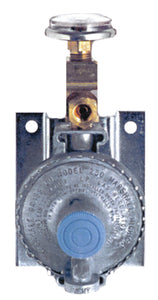Description
Description
Trident Marine 1211-1401 LPG Regulator, Wall Mount with Gauge
By mounting on the wall, this regulator saves space in your LPG locker - especially when a solenoid, gas grill conversion kit, etc. are added.
The 1211-1401 model includes 20" pig tail adaptor hose with a male POL tank fitting and 1/4" male inverted flare fitting that fits this regulator.
The 1211-1411 model does not include a tank connector hose.
- Fully assembled and leak tested
- Meets ABYC marine LPG standards
- Includes 2-piece mounting bracket and 300 psi gauge for required LPG system leak test
- Solid brass: male POL cylinder fitting, street tee & 300 PSI gauge (low profile, water tight, stainless steel)
- UL Listed die cast zinc body
- Regulator gas inlet: 1/4" male inverted flare fitting
- Regulator gas outlet 3/8" female NPT
Heavy on the technical side...
What Does That Pressure Gauge Tell You?
Thinking back to your high school chemistry class — because of the physics of your propane tank always containing both liquid and gaseous propane, the pressure inside the tank remains virtually constant until all the liquid propane is gone and the tank is functionally empty.*
For this reason - and unlike gas-only SCUBA or CNG tanks - the pressure on the gauge cannot be used to determine how full the tank is.
The pressure gauge is only there to perform periodic leak tests to check the integrity of your system.
We recommend that leak tests be performed every time the tank valve is opened, and at least every two weeks when the valve is left open during extended use.
How Much Propane Is Left In My Tank?
To determine how much propane is left in a tank, you have to weigh it and then subtract the known weight of the empty tank.
Or, with a translucent composite tank, you can just look at it to see the level of the liquid propane in the tank. This feature, alone, probably goes a long way toward explaining the huge popularity of composite propane tanks.
* The pressure in the tank will vary somewhat with changes in the ambient temperature.
Additional Information
For more information, visit P65Warnings.ca.gov

